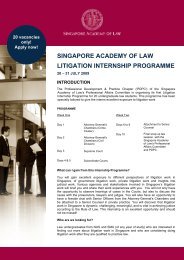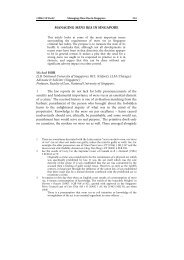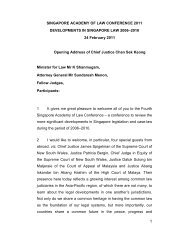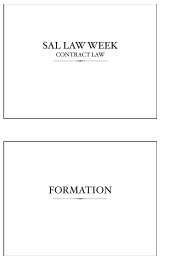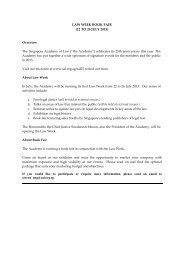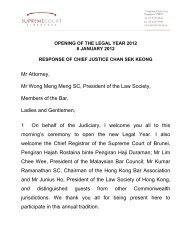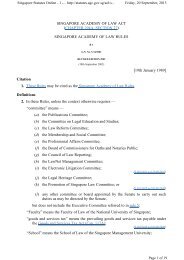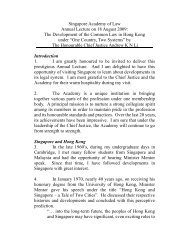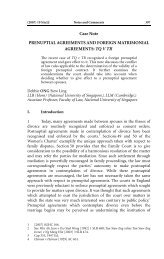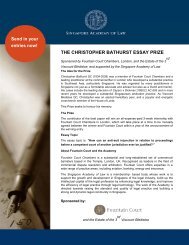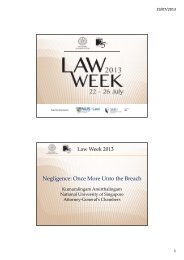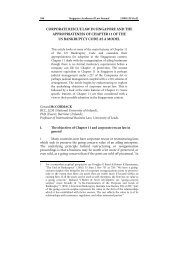View Article - Singapore Academy of Law
View Article - Singapore Academy of Law
View Article - Singapore Academy of Law
Create successful ePaper yourself
Turn your PDF publications into a flip-book with our unique Google optimized e-Paper software.
300<br />
<strong>Singapore</strong> <strong>Academy</strong> <strong>of</strong> <strong>Law</strong> Journal (2003)<br />
6.4.2.3 Civil suit filed in the High Court to be heard with ancillary<br />
matters—transfer up <strong>of</strong> ancillary matters from the Family<br />
Court<br />
217 An example <strong>of</strong> a case in which this was done is Wong Ser Wan v<br />
Ng Bok Eng Holdings Private Limited and Another (Suit No. 310 <strong>of</strong><br />
2003/H) (“Suit No. 310”). The basis <strong>of</strong> Suit No. 310 was that certain<br />
shares and property had been transferred to the defendants by the<br />
plaintiff’s husband with the intention to, inter alia, dissipate and dispose<br />
<strong>of</strong> his assets to deprive the plaintiff <strong>of</strong> a just and equitable division <strong>of</strong> the<br />
said shares and property in the event <strong>of</strong> a dissolution <strong>of</strong> marriage. The<br />
plaintiff wife in Suit No. 310 had commenced divorce proceedings<br />
against the husband (in Divorce Petition No. 2545 <strong>of</strong> 1999) and obtained<br />
a decree nisi before the said suit was filed. The plaintiff then applied,<br />
inter alia, for the actions in the divorce petition, as well as several<br />
maintenance summonses which she had taken out, to be transferred to<br />
the High Court. The application was dismissed by the assistant registrar,<br />
but allowed on appeal by the High Court 132 . The ancillary matters had not<br />
been disposed <strong>of</strong> at the time <strong>of</strong> the application. The High Court further<br />
ordered that the actions be heard and determined immediately after the<br />
trial <strong>of</strong> Suit No. 310, before the same High Court judge.<br />
218 The provision governing the transfer <strong>of</strong> cases from the District<br />
Court to the High Court is Section 38 SCA 133 , which states:<br />
132 Order made on 7 May 2003. No judgment was written by the court.<br />
133 It may be argued that since the Transfer Order and the Second Transfer Order, which<br />
gave the District Court jurisdiction to hear certain family matters, were made by the<br />
Chief Justice pursuant Section 28A SCJA (see the discussion on Section 28A SCJA<br />
at Section 6.4.2.2 (b) above), this removes the power <strong>of</strong> a High Court judge to<br />
transfer the ancillary matters in a divorce case from the Family Court to the High<br />
Court under Section 38 SCA. It is submitted, however, that the better view is that the<br />
Transfer Order and the Second Transfer Order did not so remove the power <strong>of</strong> the<br />
High Court judge. This is because, on a plain reading <strong>of</strong> Section 28A SCJA, the<br />
Chief Justice is empowered to confer jurisdiction on the District Court to deal with<br />
certain matters, but the section does not expressly state that the High Court may no<br />
longer deal with such matters after such jurisdiction is conferred on the District<br />
Court. The latter position would unfairly deprive parties whose divorce petitions have<br />
been filed in the Family Court <strong>of</strong> a potential avenue in the disposal <strong>of</strong> their cases<br />
which is available to parties in ordinary civil suits filed in the District Court. It is<br />
therefore submitted that the Transfer Order and the Second Transfer Order were not<br />
intended to preclude the High Court from being able to deal with ancillary matters in<br />
all cases, and that, therefore, in appropriate cases, the ancillary matters may be<br />
transferred up from the Family Court to the High Court under Section 38 SCA.



